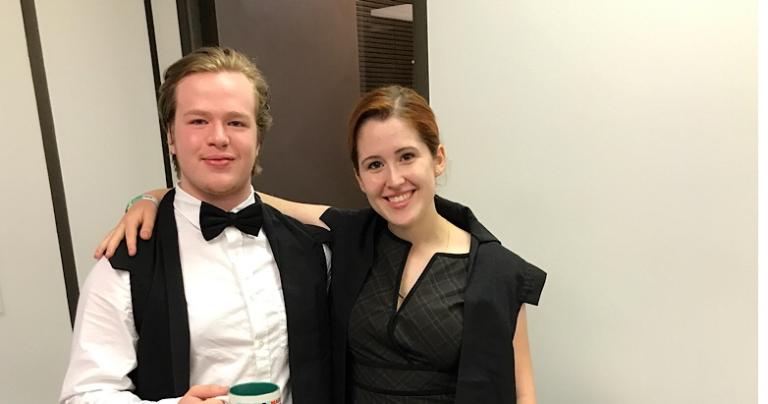
Spend enough time in graduate school and it is hard to write a normal email. “I am coming to the party” turns into “The party, perhaps, is a state of affairs for which there is a possible world such that I am there. LOL.”
The key absurdity is the desperate LOL. Academics, like teachers, struggle with humor. Somehow, someway, we hope that our inability to write a sentence in standard English will be covered by the almighty “just kidding.”
It does not.
No group suffers more from our inability to communicate than college students. Here is a question from a bright honors college student:
I am wondering what your thoughts are on making Christian intellectualism approachable. Intellectuals have a reputation for being above the rest of society and hard to communicate with unless you are an expert in a common field. Popular intellectuals tend to be shallow or strongly opinionated. How would you make intellectualism something that can be shared with the masses without dumbing it down?
Anybody who works hard, accomplishes something, and is good at what they do, runs the risk of becoming snobby about success. Try getting fitness advice from an athlete. If they ever had the problems the rest of us have working out, they have not had them in years, forgetting the struggle in the success. This does not have to happen and a good athletic trainer who knows her stuff can communicate well, and sympathize with learners and might help the more schlubby amongst us achieve at our lower level.
The athletic example points to a problem when it comes to “intellectualism.”*
When it comes to working out, nobody (especially not me) resents being at a lower level. We know. We admit it and we are ready to change. It is much harder when it comes to intellectual activity. We take that personally and if we do not think as well (on an issue) as someone else, that can be delicate for the teacher or mentor.
It is hard in both directions to accept that in some areas, I might have a good understanding of an issue, even having read quite a few books, but lack an expert’s touch. For example, I read and think about politics a good bit, but defer to my colleague Dr. Stacey who has mastery in that area. He has been put through the grinder of academic training at University of Virginia on politics and there is no easy substitute for that experience. I push back when we disagree, but with deference to his expertise.
This can be hard, especially when my reading has been very extensive, yet self-teaching comes without the sharpening or the techniques taught in a discipline. An outside voice can be valuable, but for every time one of us who are outsiders to a discipline shouts “the Emperor has no clothes!” there are multiple instances of shaming ourselves without intending to do so or even knowing that we are.
Nobody has mastered more than a corner of a discipline, but if I don’t have the math to follow the arguments in physics, then dismissing some view in physics based on a lay level book I have read is foolish. In the same way, people who dismiss modern forms of a philosophical argument that depend on modal logic should know modal logic. This has practical results. I try not to give opinions about areas where I have not done some study and to temper my forcefulness to the level of study I have done! If I do not deeply study an area, I try to go with the consensus of experts.
Notice then that when an expert in an area speaks, we face three problems. The academic (God help us!) might struggle with pride or find making difficult subjects accessible hard. The non-academic might have a pride problem too while also struggling to understand a new subject area.
Too often everyone gives up, but that is deadly in a Republic. We need experts, and that will mean the academic and intellectual life, and we need outsiders keeping us honest.
How do we do this?
First, we have to try and that means knowing our limits. Just because I went to college and have graduate degrees does not make me an expert. Appealing to my opinion as a PhD on an issue like global warming would be fallacious: a false appeal to authority. I am not an authority in that area at all . . .not one tiny bit.
If a person went to college years ago, but is not a regular reader, then skills may have faded. I was in decent shape in college, but that does not say anything about today!
We all have strengths and weaknesses and my mathematically inclined friends help me as I try to help them in the humanities. Our goal as people is to master and enjoy as much of the truth as we can while also recognizing our different levels of competence.
Second, people with a strong background in an important area either should find people to recommend who do communicate to others or learn to do so themselves. All of us need experts to vote as citizens, to be involved as church people, and live our lives! Do to others as you would have them do to you . . .the man who can tell me how to fix my car, based on years of training, perhaps should treat my thoughts on his philosophy the way he wishes I would treat his thoughts on my driving.
Christians have an advantage here, though we do not use it often. People are not valuable as people because of what they can do or know. My plumber is a better plumber than I, but that does not make him a better man than I. Father Richard has more theological training than both of us and we should pay attention to him when he speaks on that subject, but he would be the first to say that this does not make him “more human.”
We can have different roles without losing our common value as people. Our rights come from God and are based on our humanity!
Assuming the best, all of us listening and learning in humility, we will still make mistakes. Experts, even with an overwhelming consensus, can be wrong. Going with an ill-informed hunch sometimes will work, but not usually. We cannot be discouraged by this . . . the wonder of growing into adulthood as a society is that we make mistakes.
Because experts speaking to the general public have to simplify and have biases just like any other opinion, I try to read multiple experts to get a take on an issue. When I am speaking as an expert, I try to qualify what I am saying and point to where my simplifications might be deceptive. (Take an expert seriously when he says- “It is more complicated than that. . . “)
Sometimes an informed citizen will do her homework and end up disagreeing with the consensus of experts. This is safest if she finds a significant dissident community in the field. Still even then, she should be cautious. We tend to look for experts to confirm our prejudices . . . it is always good to let an uncomfortable opinion sit in our minds for a good long time . . . to make sure we are not just rejecting the better argument, because we do not like the conclusions.
All of us should live a thoughtful life and in some area most of us will become experts. If we recall that, then the Golden Rule will cover and tolerance will cover the inability for some of us in academia to write standard English!
———————————–
*See the first piece in this series I expressed my dislike of the way some (NOT this questioner) use the term “intellectualism.” I will use it to answer the question, but would prefer “academic” or “thoughtful” life.
If I get to them all, there are twenty-two questions. Here is: 1, 2.
















